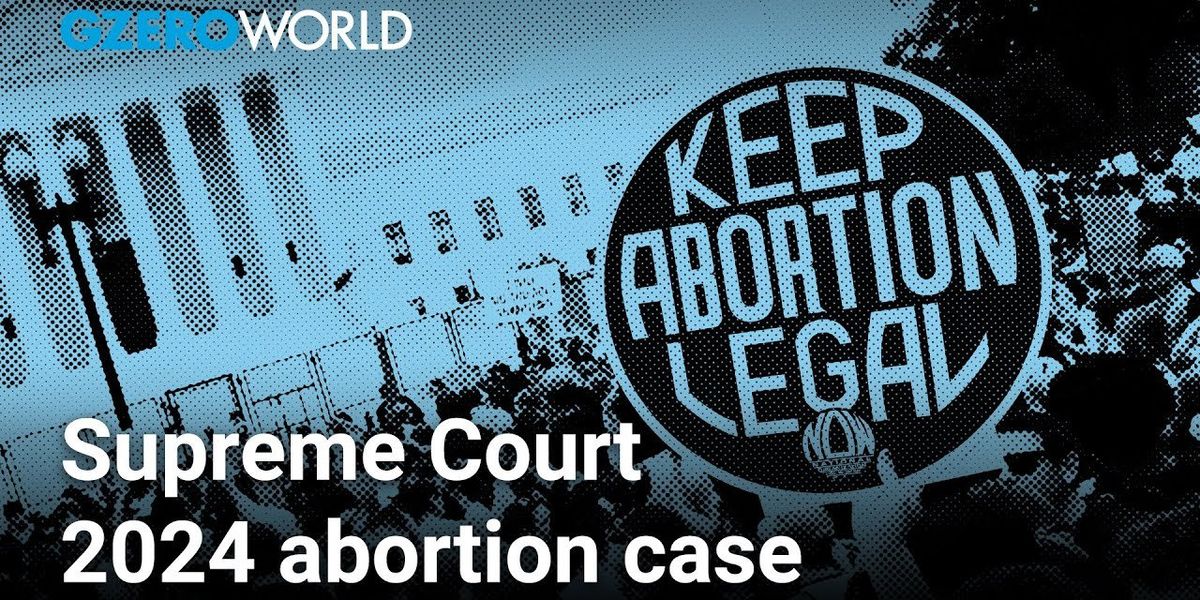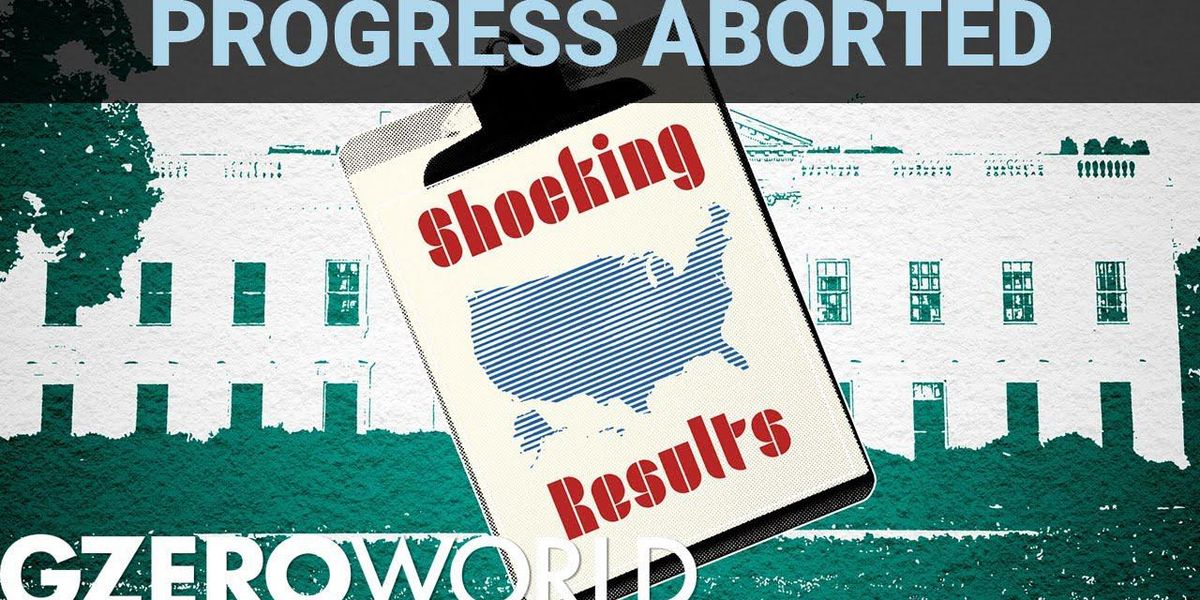Trending Now
We have updated our Privacy Policy and Terms of Use for Eurasia Group and its affiliates, including GZERO Media, to clarify the types of data we collect, how we collect it, how we use data and with whom we share data. By using our website you consent to our Terms and Conditions and Privacy Policy, including the transfer of your personal data to the United States from your country of residence, and our use of cookies described in our Cookie Policy.
{{ subpage.title }}
1 story 3 numbers: Three years post the Dobbs decision
Three years after the US Supreme Court overturned Roe v. Wade, a 1973 ruling that protected federal abortion access, the United States remains deeply fractured on the issue. The ruling gave states the power to set their own abortion laws, triggering a wave of bans across the South and Midwest, while other states moved to safeguard access. Here’s a look at where things stand nationwide, three years on.
Supreme Court will rule on abortion rights once again. What’s at stake now?
“The [abortion pill case] affects women across the country, it’s not state by state,” Bazelon stresses, “It’s the FDA’s authority to allow pills to be shipped everywhere and other rules that have made abortion pills more accessible for women in blue as well as red states.”
A group of doctors is challenging the Food and Drug Administration's authority to allow doctors to prescribe abortion pills without an in-person visit with a patient and for those pills to be sent through the mail. Bazelon explains that this group of plaintiffs is unusual in that they haven’t yet experienced direct harm from the FDA’s ruling, which you usually need to prove has happened before a case makes it all the way up to the highest court in the land. Four female justices are also on the bench this year, a historic high-water mark. Could that make a difference in the way justices rule on either case?
Catch GZERO World with Ian Bremmer every week on US public television (check local listings) and online.
- Podcast: (Un)packing the Supreme Court with Yale Law's Emily Bazelon ›
- Who polices the Supreme Court? ›
- Abortion in Florida: banned and on the ballot ›
- The Graphic Truth: Abortion laws around the world ›
- Why do Americans get so worked up about abortion? ›
- Should we rethink the global aging crisis? - GZERO Media ›
- Why the world is facing a population crisis - GZERO Media ›
South Carolina Republican state senator Penry Gustafson debates a six week abortion ban at the state legislature
South Carolina's six-week abortion ban
Victims of rape or incest will be able to access abortion care for up to 12 weeks gestation, according to the bill, which also has exceptions for if the mother’s life is in danger or if there are fetal abnormalities.
Opponents have vowed to challenge the bill in court, but it’s unclear how that might pan out. Consider that in 2021, the state legislature passed a similar measure that was struck down by the state Supreme Court, which claimed that curtailing abortion access violates women’s right to privacy. That has allowed abortion to remain legal in the state for up to 22 weeks, making South Carolina a haven for southern women seeking the procedure.
The bill would have passed earlier were it not for six bipartisan women lawmakers in the Senate – three Republicans, two Democrats, and one independent – who used a legislative procedure known as a filibuster to stall the bill’s passage.
As the presidential race gets underway, the Palmetto State will serve as a test case for candidates running for president. In particular, former Gov. Nikki Haley and Sen. Tim Scott, both South Carolinians who are running for the GOP nomination, will be forced to respond. Coming out too strong against abortion access won’t land well with an electorate that overwhelmingly backs Roe v. Wade – as proven by the 2022 midterm results. However, dissing the bill will surely be used as a cudgel by Donald Trump, and others, in a Republican primary.
The political machine that took down Roe v. Wade
50 years ago, when the Supreme Court granted the constitutional right to abortion, the country was far less divided than is it today. Now with that Roe v. Wade decision overturned, roughly half the states have "trigger laws" on the books restricting abortion, New York Times columnist Emily Bazelon tells Ian Bremmer on GZERO World.
From a constitutional perspective, Bazelon says that abortion decisions today depend "on what you think of the idea that abortion is fundamental to women's liberty and equality" — a hard sell for what she calls a "maximalist" conservative majority on the court.
Bazelon adds that access to abortion pills is going to turn into a big legal battle. The Justice Department is working to ensure states can't ban abortion pills, which are federally approved, but Congress (as a whole) will be a tough sell.
But much of the rest of the world has been moving in the opposite direction. Largely Catholic countries in Latin America and Europe have legalized abortion, while African nations have rolled back or are rethinking colonial-era abortion bans. Regardless, the SCOTUS ruling will make waves around the world.
The abortion fight to come: why US Congressional control matters
New York Times columnist Emily Bazelon says the Justice Department is working to ensure states can't ban abortion pills, which are federally approved.
But then Congress (as a whole) will be a tough sell, she tells Ian Bremmer on GZERO World.
The House could enshrine Roe v. Wade into law, but it'll surely die in the Senate, where Democrats remain "paralyzed" over getting rid of the filibuster. And then, of course, the next Congress could repeal the whole thing.
Still, even if Republicans win control of both houses in November, she doubts the GOP majority will move to outlaw abortion at the federal level.
Watch the GZERO World episode: US Supreme Court fights: why ending Roe is only the beginning
- Podcast: An active US Supreme Court overturns "settled law" on ... ›
- The Graphic Truth: America's increased use of abortion pills ... ›
- The Graphic Truth: Abortion and race in America - GZERO Media ›
- Why do Americans get so worked up about abortion? - GZERO Media ›
- The political machine that took down Roe v. Wade - GZERO Media ›
Abortion rights are expanding around the world while the US is an outlier
Almost 50 years ago, the wife of a Republican US president came out in favor of abortion. Good luck with that happening today.
We now live in a much more divided country — as has been on full display after the Supreme Court overturned Roe v. Wade and removed the constitutional right to an abortion, Ian Bremmer tells GZERO World.
Interestingly, much of the rest of the world has been moving in the opposite direction. Largely Catholic countries in Latin America and Europe have legalized abortion in recent years, while African nations have rolled back or are rethinking colonial-era abortion bans.
China is ... complicated.
Regardless, the SCOTUS ruling will make waves around the world.
Watch the GZERO World episode: US Supreme Court fights: why ending Roe is only the beginning
Why permitting some abortion is smart politics
Since the SCOTUS Roe v. Wade ruling was leaked a couple of months ago, the GOP has refrained from putting Republican-led states on an abortion "purity test," says New York Times columnist Emily Bazelon.
Why? Because the majority of Americans believe abortion should be legal in some cases — but not all.
"Everything depends on where you draw the line," Bazelon tells Ian Bremmer on GZERO World.
The devil is in the details. "Which states and where and how many matters a lot," she says, adding that enforcement and access to abortion pills is going to turn into a big legal battle.
Watch the GZERO World episode: US Supreme Court fights: why ending Roe is only the beginning
Podcast: An active US Supreme Court overturns "settled law" on abortion. What's next?
Listen: Americans now live in a much more divided country — as has been on full display after the US Supreme Court overturned Roe v. Wade and removed the constitutional right to an abortion, while the rest of the world - including largely Catholic countries in Latin America and Europe - is moving in the opposite direction. But the SCOTUS ruling is already making waves around the world.
On the GZERO World podcast, Ian Bremmer speaks to New York Times columnist and senior research fellow at Yale Law School, Emily Bazelon, who knows a thing or two about abortion law.
Hours after the bombshell ruling dropped on June 24, Bazelon analyzed what abortion rights will soon look like across different US states; why SCOTUS upheld the constitutional right to carry guns but not to get an abortion; the next steps by the Biden administration and Congress; and why the battle over abortion pills is likely headed to the same court that got rid of Roe.
Subscribe to the GZERO World Podcast on Apple Podcasts, Spotify, Stitcher, or your preferred podcast platform, to receive new episodes as soon as they're published.



